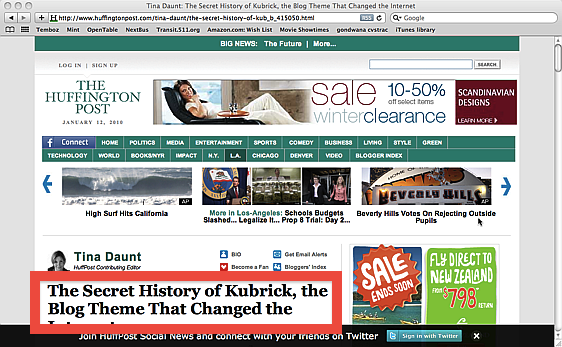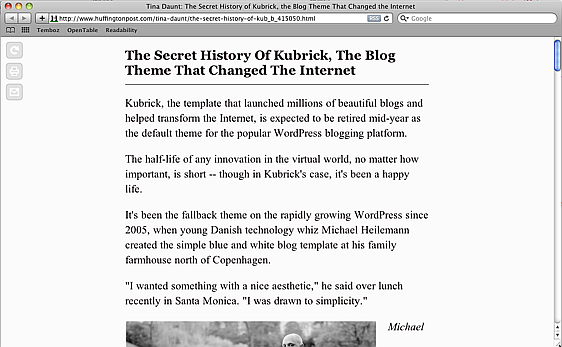From 2000 to 2007, I lived and worked in downtown San Francisco, and did not need a car to commute, so I never bothered to get one. When Acxiom purchased Kefta, they moved us to Foster City, 23 miles away and with no credible transit options, so I ended up buying a BMW 525i. I considered getting a Prius or a Lexus GS 450h hybrid, but opted not to. The Toyota faulty accelerator pedal fiasco makes me glad I passed.
In the eighties, Audi lost two thirds of its sales due to an unjustified rumor that its cars were prone to “sudden acceleration”. It took them 15 years to recover. The damage to Toyota will be even worse, since in this case there is in fact a problem, and the company’s damning slowness in responding will be excoriated in the court of public opinion, destroying a mostly deserved reputation for building reliable, if ugly cars. Ford, Hyundai and Honda must be licking their chops right now.
To my surprise the recall was brought home to me. Two months ago, I was car #3 in a 4-car collision (I braked in time, but the car behind me did not have as good brakes and tires as mine and rear-ended me into the car in front of me). My car has been in the garage since then and I rented a car from Enterprise Rent-a-Car (I try to patronize my clients whenever possible). The car is a Pontiac Vibe, which is essentially the same as the Toyota Matrix, both made right here in the Bay Area in the recently shuttered Fremont NUMMI plant. It has the faulty part, and Enterprise called me to exchange the car (kudos to them for being so proactive).
On August 28, 2009, California Highway Patrol officer Mark Saylor died in a horrendous car crash in San Diego county, along with his wife, daughter and brother-in-law, while driving a loaner Lexus ES350. The brother-in-law actually called 911 to report the accelerator was jammed. This was a different issue, one of incorrect floor mat causing the accelerator pedal to jam in the fully opened position. The car was traveling at over 100mph before the driver lost control, the car went airborne, turned over and crashed with an explosion, killing all the passengers instantly. The dealership bears a heavy responsibility in these deaths for fitting the incorrect mats, and failing to respond to a previous driver’s report of a similar incident. The rubber mats on my BMW have bolts that lock them in position with no chance of slipping, and I am surprised Lexus had such shoddy engineering in the first place. Perhaps the reputation of German engineers is not overdone, after all.
On modern cars, the brakes and even the handbrake have enough stopping power to counter the engine’s maximum torque. There is the option to switch the car to neutral gear, assuming there is no malfunction of the transmission. Shutting down the engine is not recommended, as that would also cut power to brakes and power steering, but in any case this car had a keyless ignition system, which requires pressing and holding the ignition button for three seconds. If you are in a panic situation with an unfamilar car, it is highly unlikely you will get this maneuver right, assuming you have three seconds to spare in the first place. I have a similar system in my own car, and had no idea what the procedure is to shut down a running engine.
Modern carmakers are integrators, assembling parts made by their subcontractors. It is not an exaggeration to say the German carmakers are mostly Bosch OEMs. The accelerator pedal involved in the Toyota recall is made by CTS, a US telecom gear maker who only incidentally makes auto parts. Historically Japanese companies have been resistant to using parts from non-Japanese suppliers. In many cases this was due to the keiretsu system of companies interwoven by complex cross-holdings, a successor to the zaibatsu system outlawed after the post-war US occupation of Japan. In other cases, it was due to objective factors — Japanese electronics manufacturers use high-speed power screwdrivers to speed up assembly, and US-made screws used inferior alloys compared to Japanese screw makers, stripping too easily. It took severe pressure and the threat of sanctions from US trade representatives to convince Japanese carmakers to give US suppliers a chance. This incident is likely to harden Japanese executives’ suspicion of gaijin suppliers.
On modern cars, the accelerator pedal is “drive by wire”, i.e. it is an electronic peripheral that feeds the engine control computer. Airbus introduced fly-by-wire controls in its aircraft as more conservative Boeing stuck to hydraulic controls, and this was a significant factor in Airbus overtaking Boeing in airliners. Change takes time, and carmakers are understandably hesitant to change a critical safety organ like brakes. The brake pedals are still hydraulically linked to the brakes, but have an electronic sensor to control the rear brake lights and disengage cruise control.
BMWs, Audis, and even cheaper cars like Volkswagen or Chrysler have a feature called brake override where the engine control will disable the accelerator when the brake pedal is applied. Toyota deliberately chose not to implement such a system, which would have saved Mark Saylor’s life and his family’s. This refusal is particularly incomprehensible since the hardware is already here, and the change should only require a software change and the ensuing QA and certification cycle. The software was not bad per se, but the requirements were incomplete, and this is yet one more case where bad software kills.
Update (2014-03-19):
Toyota was hit today by the Department of Justice with a record $1.2B criminal fine for its attempted cover-up, and admitted guilt. GM is apparently next.


